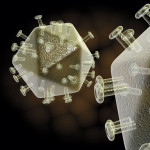Using crystal meth may lead HIV to cause greater harm to the body among people with the virus who are on antiretroviral (ARV) treatment. That is according to a pair of recent studies led by Adam Carrico, PhD, an associate professor of public health sciences and psychology at the University of Miami Miller School of Medicine.
In a study published in Brain, Behavior and Immunity, Carrico and his colleagues conducted genetic analyses on samples from 55 HIV-positive men who have sex with men who reported using crystal meth, including 27 whose urine samples indicated they had recently used stimulants and 28 whose samples indicated they had not. The men were all on ARVs and had a fully suppressed viral load.
The study authors found that stimulants apparently affect immune-system pathways that lead HIV to become more active and also possibly expand the viral reservoir.
“The differences in gene expression we observed in recent stimulant users are like flipping switches that turn on parts of the immune system that expand the HIV reservoir,” Carrico said in a press release.
This study’s findings could yield insights that would help in HIV cure research, including in the development of “shock-and-kill” methods that shake the virus out of a latent state in immune cells (where it otherwise hides from ARV treatment) and then kill off those infected cells.
In a second study, published in the journal AIDS, Carrico and his colleagues studied 84 HIV-positive meth-using men who were on successful ARV treatment. They found that those men whose tests indicated they had recently used stimulants had greater evidence of activation of immune cells known as monocytes. Such activation is a factor that predicts faster progression of HIV disease as well as the development of cardiovascular disease.
To read a press release about the study, click here.
To read the Brain, Behavior and Immunity abstract, click here.
To read the AIDS abstract, click here.







2 Comments
2 Comments